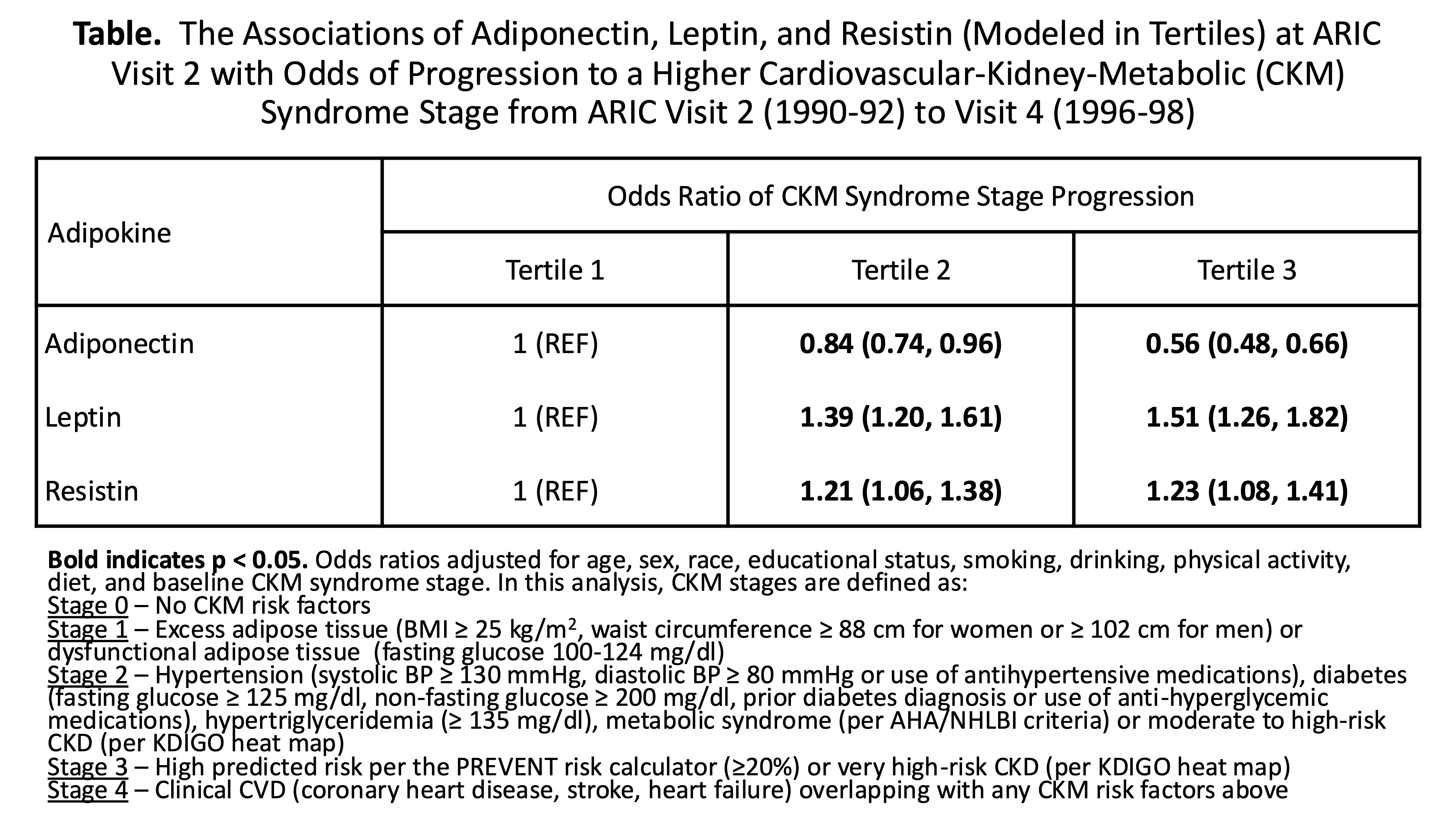Final ID: 031
Associations of Adipokines with 6-Year Progression of Cardiovascular-Kidney-Metabolic Syndrome: The Atherosclerosis Risk in Communities (ARIC) Study
Abstract Body: Background: Adipose tissue and its signaling molecules are central to cardiovascular-kidney-metabolic (CKM) syndrome development. High levels of pro-inflammatory adipokines and low levels of anti-inflammatory adipokines have been linked with worsening metabolic health and increased cardiovascular disease (CVD) risk. However, there have not yet been investigations of how adipokines relate to changes in CKM health over time.
Methods: We examined 7695 White and Black ARIC participants without baseline CVD and with adipokine measurements and data required to assess CKM stage at both Visits 2 (1990-92) and 4 (1996-98), an approximate 6-year interval. CKM stage was defined as stage 0: no CKM risk factors; stage 1: excess/dysfunctional adiposity; stage 2: metabolic risk factors (hypertension, diabetes, metabolic syndrome, hypertriglyceridemia) and/or moderate to high risk chronic kidney disease (CKD); stage 3: ≥ 20% predicted CVD risk using the PREVENT calculator or very high risk CKD, and stage 4: overt CVD overlapping with CKM risk factors. Among those in CKM stages 0-3 at Visit 2 (baseline), we used logistic regression to evaluate the associations of higher levels of adiponectin, leptin, and resistin at Visit 2 (modeled per 1-SD and according to tertiles) with the odds of progression to a higher CKM stage by Visit 4.
Results: The mean age was 57 years (56% female, 79% White). At baseline, 6% had stage 0 CKM syndrome, 24% had stage 1 CKM syndrome, 68% had stage 2 CKM syndrome, and 2% had stage 3 CKM syndrome. Overall, 33% of participants progressed to a worse CKM stage during the 6 years of follow-up. After adjustment for sociodemographics, lifestyle factors, and CKM stage at baseline, higher adiponectin (per 1-SD) was associated with 24% lower odds of progressing to a worse CKM stage (OR 0.76, 95% CI[0.71, 0.81]). Conversely, higher leptin and resistin (per 1-SD) were associated with 29% (OR 1.29, 95% CI[1.19, 1.39]) and 9% (OR 1.09, 95% CI[1.03, 1.15] higher odds of CKM stage progression, respectively. Graded associations with similar directionality as those described were seen when baseline adipokine levels were modeled in tertiles (Table).
Conclusion: Adipokines are significantly associated with CKM syndrome progression. These proteins may help to inform the prediction and prevention of a worsening trajectory of CKM syndrome over time.
Methods: We examined 7695 White and Black ARIC participants without baseline CVD and with adipokine measurements and data required to assess CKM stage at both Visits 2 (1990-92) and 4 (1996-98), an approximate 6-year interval. CKM stage was defined as stage 0: no CKM risk factors; stage 1: excess/dysfunctional adiposity; stage 2: metabolic risk factors (hypertension, diabetes, metabolic syndrome, hypertriglyceridemia) and/or moderate to high risk chronic kidney disease (CKD); stage 3: ≥ 20% predicted CVD risk using the PREVENT calculator or very high risk CKD, and stage 4: overt CVD overlapping with CKM risk factors. Among those in CKM stages 0-3 at Visit 2 (baseline), we used logistic regression to evaluate the associations of higher levels of adiponectin, leptin, and resistin at Visit 2 (modeled per 1-SD and according to tertiles) with the odds of progression to a higher CKM stage by Visit 4.
Results: The mean age was 57 years (56% female, 79% White). At baseline, 6% had stage 0 CKM syndrome, 24% had stage 1 CKM syndrome, 68% had stage 2 CKM syndrome, and 2% had stage 3 CKM syndrome. Overall, 33% of participants progressed to a worse CKM stage during the 6 years of follow-up. After adjustment for sociodemographics, lifestyle factors, and CKM stage at baseline, higher adiponectin (per 1-SD) was associated with 24% lower odds of progressing to a worse CKM stage (OR 0.76, 95% CI[0.71, 0.81]). Conversely, higher leptin and resistin (per 1-SD) were associated with 29% (OR 1.29, 95% CI[1.19, 1.39]) and 9% (OR 1.09, 95% CI[1.03, 1.15] higher odds of CKM stage progression, respectively. Graded associations with similar directionality as those described were seen when baseline adipokine levels were modeled in tertiles (Table).
Conclusion: Adipokines are significantly associated with CKM syndrome progression. These proteins may help to inform the prediction and prevention of a worsening trajectory of CKM syndrome over time.
More abstracts on this topic:
AI-Derived Retinal Vasculature Features Predict Cardiovascular Risk in Patients with Chronic Kidney Disease: Insights from the CRIC Study
Dhamdhere Rohan, Modanwal Gourav, Rahman Mahboob, Al-kindi Sadeer, Madabhushi Anant
A Multimodal Artificial Intelligence Signature of Advanced Cardiac and Vascular Aging Defines Elevated Risk of Cardiovascular DiseasePerera Sudheesha, Biswas Dhruva, Dhingra Lovedeep, Aminorroaya Arya, Coppi Andreas, Khera Rohan

